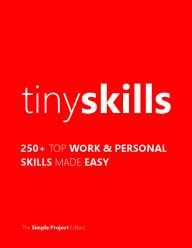On October 25, 2016 By thesuccessmanual Topic: Business, Remarkable
Google is the most influential company of the first decade of the 21st century. What can companies learn from Google?
This guide belongs to 100 Ways To Be Being Remarkable Series, a special project that brings you business and self-development advice from The Success Manual.
Lesson 1. Simple, clear vision - Google is driven by the mission to organize the world's knowledge.
Lesson 2: Smart Hiring - Google is great at hiring good people.
Google's hiring policy favors ability over experience. The company is famously elitist when it comes to hiring. Almost every candidate talks to at least half-a-dozen interviewers, drawn from both management and potential colleagues
Google's grueling hiring process, akin to a Mensa test, values nonconformity nearly as highly as genius. Preference is given to candidates who have weird avocations and out-of-the-ordinary experiences.
Lesson 3: Small teams - Half of its employees -- all those involved in product development -- work in pint-sized teams, with an average of three or four engineers per team.
Lesson 4: Constant Feedback - Every project team maintains a Web site that is continuously monitored for peer feedback.
Lesson 5: Retain good people - The company has something called ‘The Founders' Awards’, an annual multimillion dollar payout to teams who've made outsize contributions to Google's growth.
Lesson 6: Innovation - All Google engineers are encouraged to spend 20 percent (20%) of their work time on projects that interest them. Some of Google's newer services, such as Gmail, Google News and orkut, originated from these independent endeavors.
Lesson 7: Eat your own dog food - Google workers use the company's tools intensively. There is an internal Web page for virtually every project and every task. They are all indexed and available to project participants on an as-needed basis.
Lesson 8: FLAT ORGANIZATIONAL STRUCTURE
The company's hierarchy for engineers is flat. There are just five levels:
1 Programmer – 2 Tech Lead – 3 Manager – 4 Department Lead – 5 Top Management [Larry Page/Sergey Brin/Eric Schmidt]
Lesson 9: Inspiring Corporate Philosophy - Google has cool corporate philosophy. Many say its philosophies, advertised freely all over the world by other people, myself included, is its biggest Public Relations coup.
The corporate philosophy is based on many casual principles. A complete list of corporate fundamentals is available on Google's website.
A SUMMARY OF GOOGLE’S CORPORATE PHILOSHY
1. Focus on the user and all else will follow.
2. It's best to do one thing really, really well. - Google does search. With one of the world's largest research
3. Fast is better than slow.
4. Democracy on the web works.
5. You don't need to be at your desk to need an answer.
6. You can make money without doing evil.
7. There's always more information out there.
8. The need for information crosses all borders.
9. You can be serious without a suit.
10. Great just isn't good enough.
THE GOOGLE STORY- A SUMMARY
‘The Google Story’ is written by David Vise and Mark Malseed. The Google Story is an account of how Google rose to the top from its beginning as a research project. It tells you how Google got to the top in the internet world driven by its simple aim of organizing the world’s information.
1. Connections are everything. Because Life is a network.
2. Never compromise your ideals because someone said it’s impossible, stupid, or a waste of time.
3. Do focus on changing the world, don’t focus on the money. If you provide value, the money will come.
4. Have a healthy disregard for the impossible. If someone hasn’t done it yet, that doesn’t mean it’s impossible.
5. Money is a problem, not a solution. Money cannot solve your problems, but your solutions can solve the money problem.
6. Value creativity, not money. View creativity as your company’s true bottom-line, or your company will stop growing and die.
7. Go against the grain. Don’t believe in other people’s visions for you, believe in your own.
8. Speed is more important than looking good. A shiny, beautiful car isn’t impressive when it gets overtaken by an old jalopy; the same applies to software.
9. Organic growth is best. Only grow as fast as you need to, don’t waste money on advertising a product you won’t want your mom to use.
10. Focus on users above all else, e.g. don’t do something that might annoy your users just to make more money, they won’t forget.
11. Never betray users’ trust, or anyone else’s.
12. Spend 20% of your time on blue-sky ideas without worrying about how they will make a profit. If it might change the world for the better, it needs to be done, even if it can’t make money.
13. Don’t make enemies of your competitors to stay driven. Be driven by your own values and mission.
14. Beat your own path through the wilderness.
- Sourced from Digital Samurai
If you liked this article, please bookmark it on Delicious or share on Twitter. Thanks, friends. Follow us on Twitter. | Get Updates To This Blog Via RSS
We don't recommend any other guide than our very own The Success Manual - Encyclopedia of advice to 130 most important skills.

